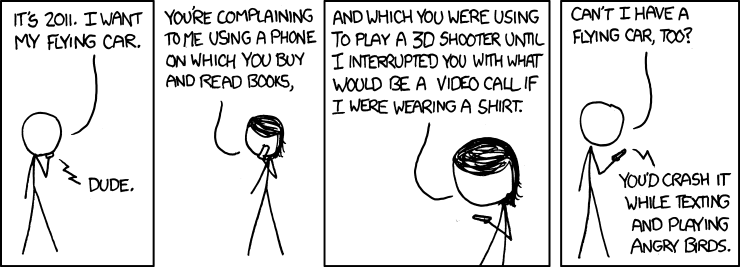As a Flying-Car Guy...
Feb. 23rd, 2011 12:18 am...I expect I'll be getting some e-mail about XKCD #864:

Speaking of reading books on one's phone, I mentioned to my sister (a heavy Sony Ereader user) that I had some books on my Droid.
"I downloaded Adam Smith's The Wealth of Nations," I said. "It sounded kind of interesting, and ever since high school I've sort of intended to read it. Now at last I'm getting through it, whenever I find a moment to read on my phone."
She has an Android phone, too. "Have you played Angry Birds?" she said. With great enthusiasm, she explained that you shoot birds at pigs, or something. (I can't blame them for being angry.) She intimated that one could spend quite a lot of time doing this.
"Let me get this straight," I said. "You think that I should spend my time shooting birds on my phone instead of finishing The Wealth of Nations?"
Usually she has been more willing to encourage my intellectual growth. In this case, one might well say, she has an unEnlightened attitude.

Speaking of reading books on one's phone, I mentioned to my sister (a heavy Sony Ereader user) that I had some books on my Droid.
"I downloaded Adam Smith's The Wealth of Nations," I said. "It sounded kind of interesting, and ever since high school I've sort of intended to read it. Now at last I'm getting through it, whenever I find a moment to read on my phone."
She has an Android phone, too. "Have you played Angry Birds?" she said. With great enthusiasm, she explained that you shoot birds at pigs, or something. (I can't blame them for being angry.) She intimated that one could spend quite a lot of time doing this.
"Let me get this straight," I said. "You think that I should spend my time shooting birds on my phone instead of finishing The Wealth of Nations?"
Usually she has been more willing to encourage my intellectual growth. In this case, one might well say, she has an unEnlightened attitude.
no subject
Date: 2011-02-23 06:27 am (UTC)no subject
Date: 2011-02-23 02:06 pm (UTC)no subject
Date: 2011-02-23 02:29 pm (UTC)no subject
Date: 2011-02-23 03:17 pm (UTC)no subject
Date: 2011-02-23 04:08 pm (UTC)To pluck a typical passage from Book 1, Chapter VIII, "Of the Wages of Labour :"Smith is describing something I would probably express with an equation or a graph. Perhaps he was not mathematically inclined; perhaps he did not want to limit his readership to those hip to algebra.
Of course, my complaint and your complaint are orthogonal (as we mathematically-inclined readers say). Putting in algebra would not have made the book less dry. But at least it could have been shorter.
no subject
Date: 2011-02-23 04:16 pm (UTC)no subject
Date: 2011-02-23 09:55 pm (UTC)no subject
Date: 2011-02-23 10:27 pm (UTC)And like most philosophy books, it's tedious to read, even if the content is worthwhile.
no subject
Date: 2011-02-23 03:55 pm (UTC)no subject
Date: 2011-02-23 04:24 pm (UTC)For symmetry, we need a major economist to comment on the works of Steven K. Brust. (I guess the remarks of Paul Krugman on Charlie Stross's work are in that ballpark somewhere.)
no subject
Date: 2011-02-23 09:55 pm (UTC)I'm going to write a story set after the Singularity, a million years hence, when we are all intergalactically-empowered immortal sentiences in the Beyond, and people will STILL BE COMPLAINING ABOUT NOT HAVING SODDING JETPACKS.
-- PNH
no subject
Date: 2011-07-18 06:44 pm (UTC)Your surmise concerning the level of familiarity with mathematics beyond arithmetic is probably correct. Even by the turn of the 19th Century, it was recognized that the need of the general population (who would get access to education, still made somewhat spottily available) in the Industrial Age to reckon accurately was valuable. However, even among the literate elite of the 1700s and 1800s, mathematical education typically did not include much in the way of algebra. (It is not in the quadrivium and there is, of course, no Muse of Algebra. Geometry was and is still considered more important in a liberal education, more for its value in teaching people how to form a rigorous logical argument, rather than to know the Postulates of Euclid and their consequences.) So I would imagine that not a large proportion of the Enlightenment philosophers had worked with algebra all that much...
Consider that, even at the turn of the *20th* Century, topics like vector and matrix algebra were still regarded as "advanced" subjects (there were only a handful of the "quantum physicists" who had seen enough abstract algebra to recognize that mid-19th Century mathematicians had already worked out how to build non-commutative systems). In 1950, calculus was still a "university" subject; Sputnik and Big Science changed that.